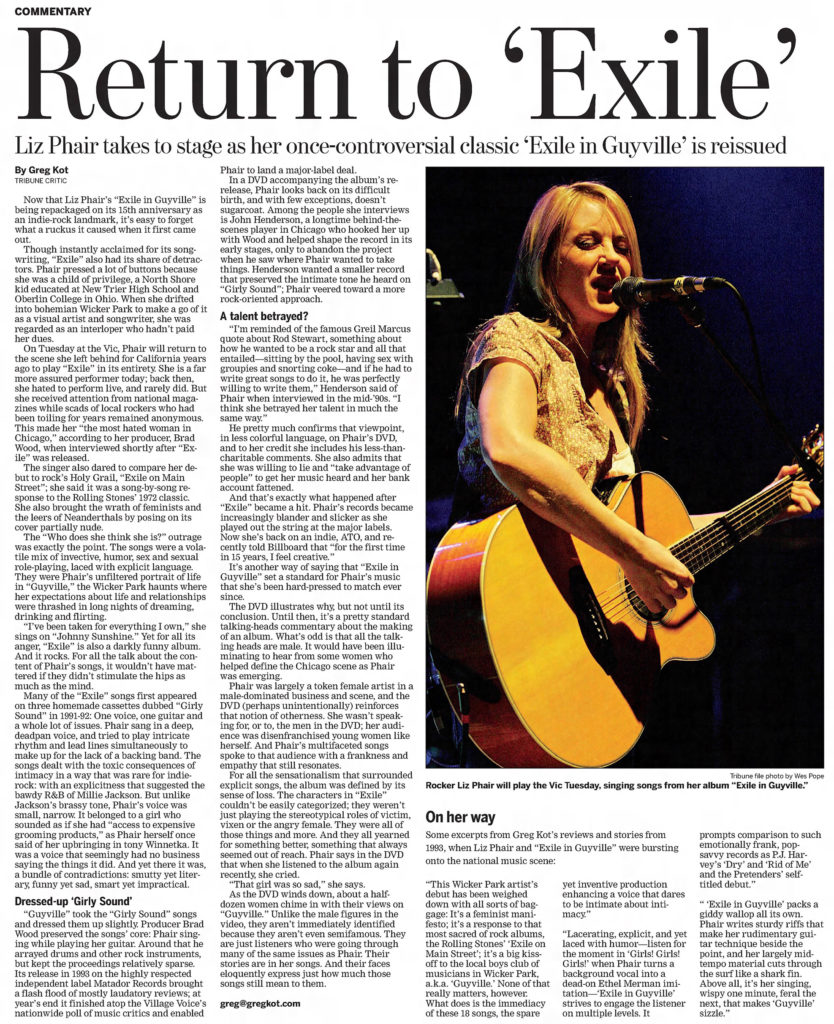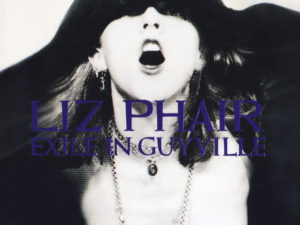By Greg Kot
Chicago Tribune, June 22, 2008
Now that Liz Phair’s “Exile in Guyville” is being repackaged on its 15th anniversary as an indie-rock landmark, it’s easy to forget what a ruckus it caused when it first came out.
Though instantly acclaimed for its songwriting, “Exile” also had its share of detractors. Phair pressed a lot of buttons because she was a child of privilege, a North Shore kid educated at New Trier High School and Oberlin College in Ohio. When she drifted into bohemian Wicker Park to make a go of it as a visual artist and songwriter, she was regarded as an interloper who hadn’t paid her dues.
On Tuesday at the Vic, Phair will return to the scene she left behind for California years ago to play “Exile” in its entirety. She is a far more assured performer today; back then, she hated to perform live, and rarely did. But she received attention from national magazines while scads of local rockers who had been toiling for years remained anonymous. This made her “the most hated woman in Chicago,” according to her producer, Brad Wood, when interviewed shortly after “Exile” was released.
The singer also dared to compare her debut to rock’s Holy Grail, “Exile on Main Street”; she said it was a song-by-song response to the Rolling Stones’ 1972 classic. She also brought the wrath of feminists and the leers of Neanderthals by posing on its cover partially nude.
The “Who does she think she is?” outrage was exactly the point. The songs were a volatile mix of invective, humor, sex and sexual role-playing, laced with explicit language. They were Phair’s unfiltered portrait of life in “Guyville,” the Wicker Park haunts where her expectations about life and relationships were thrashed in long nights of dreaming, drinking and flirting.
“I’ve been taken for everything I own,” she sings on “Johnny Sunshine.” Yet for all its anger, “Exile” is also a darkly funny album. And it rocks. For all the talk about the content of Phair’s songs, it wouldn’t have mattered if they didn’t stimulate the hips as much as the mind.
Many of the “Exile” songs first appeared on three homemade cassettes dubbed “Girly Sound” in 1991-92: One voice, one guitar and a whole lot of issues. Phair sang in a deep, deadpan voice, and tried to play intricate rhythm and lead lines simultaneously to make up for the lack of a backing band. The songs dealt with the toxic consequences of intimacy in a way that was rare for indie-rock: with an explicitness that suggested the bawdy R&B of Millie Jackson. But unlike Jackson’s brassy tone, Phair’s voice was small, narrow. It belonged to a girl who sounded as if she had “access to expensive grooming products,” as Phair herself once said of her upbringing in tony Winnetka. It was a voice that seemingly had no business saying the things it did. And yet there it was, a bundle of contradictions: smutty yet literary, funny yet sad, smart yet impractical.
Dressed-up ‘Girly Sound’
“Guyville” took the “Girly Sound” songs and dressed them up slightly. Producer Brad Wood preserved the songs’ core: Phair singing while playing her guitar. Around that he arrayed drums and other rock instruments, but kept the proceedings relatively sparse. Its release in 1993 on the highly respected independent label Matador Records brought a flash flood of mostly laudatory reviews; at year’s end it finished atop the Village Voice’s nationwide poll of music critics and enabled Phair to land a major-label deal.
In a DVD accompanying the album’s re-release, Phair looks back on its difficult birth, and with few exceptions, doesn’t sugarcoat. Among the people she interviews is John Henderson, a longtime behind-the-scenes player in Chicago who hooked her up with Wood and helped shape the record in its early stages, only to abandon the project when he saw where Phair wanted to take things. Henderson wanted a smaller record that preserved the intimate tone he heard on “Girly Sound”; Phair veered toward a more rock-oriented approach.
A talent betrayed?
“I’m reminded of the famous Greil Marcus quote about Rod Stewart, something about how he wanted to be a rock star and all that entailed — sitting by the pool, having sex with groupies and snorting coke — and if he had to write great songs to do it, he was perfectly willing to write them,” Henderson said of Phair when interviewed in the mid-’90s. “I think she betrayed her talent in much the same way.”
He pretty much confirms that viewpoint, in less colorful language, on Phair’s DVD, and to her credit she includes his less-than-charitable comments. She also admits that she was willing to lie and “take advantage of people” to get her music heard and her bank account fattened.
And that’s exactly what happened after “Exile” became a hit. Phair’s records became increasingly blander and slicker as she played out the string at the major labels. Now she’s back on an indie, ATO, and recently told Billboard that “for the first time in 15 years, I feel creative.”
It’s another way of saying that “Exile in Guyville” set a standard for Phair’s music that she’s been hard-pressed to match ever since.
The DVD illustrates why, but not until its conclusion. Until then, it’s a pretty standard talking-heads commentary about the making of an album. What’s odd is that all the talking heads are male. It would have been illuminating to hear from some women who helped define the Chicago scene as Phair was emerging.
Phair was largely a token female artist in a male-dominated business and scene, and the DVD (perhaps unintentionally) reinforces that notion of otherness. She wasn’t speaking for, or to, the men in the DVD; her audience was disenfranchised young women like herself. And Phair’s multifaceted songs spoke to that audience with a frankness and empathy that still resonates.
For all the sensationalism that surrounded explicit songs, the album was defined by its sense of loss. The characters in “Exile” couldn’t be easily categorized; they weren’t just playing the stereotypical roles of victim, vixen or the angry female. They were all of those things and more. And they all yearned for something better, something that always seemed out of reach. Phair says in the DVD that when she listened to the album again recently, she cried.
“That girl was so sad,” she says.
As the DVD winds down, about a half-dozen women chime in with their views on “Guyville.” Unlike the male figures in the video, they aren’t immediately identified because they aren’t even semifamous. They are just listeners who were going through many of the same issues as Phair. Their stories are in her songs. And their faces eloquently express just how much those songs still mean to them.
On her way
Some excerpts from Greg Kot’s reviews and stories from 1993, when Liz Phair and “Exile in Guyville” were bursting onto the national music scene:
“This Wicker Park artist’s debut has been weighed down with all sorts of baggage: It’s a feminist manifesto; it’s a response to that most sacred of rock albums, the Rolling Stones’ ‘Exile on Main Street’; it’s a big kiss-off to the local boys club of musicians in Wicker Park, a.k.a. ‘Guyville.’ None of that really matters, however. What does is the immediacy of these 18 songs, the spare yet inventive production enhancing a voice that dares to be intimate about intimacy.”
“Lacerating, explicit, and yet laced with humor — listen for the moment in ‘Girls! Girls! Girls!’ when Phair turns a background vocal into a dead-on Ethel Merman imitation — ‘Exile in Guyville’ strives to engage the listener on multiple levels. It prompts comparison to such emotionally frank, pop-savvy records as P.J. Harvey’s ‘Dry’ and ‘Rid of Me’ and the Pretenders’ self-titled debut.”
“‘Exile in Guyville’ packs a giddy wallop all its own. Phair writes sturdy riffs that make her rudimentary guitar technique beside the point, and her largely mid-tempo material cuts through the surf like a shark fin. Above all, it’s her singing, wispy one minute, feral the next, that makes ‘Guyville’ sizzle.”
Featured Image: Liz Phair performs at the Vic Theatre on October 25, 2005. (Photo: Wes Pope/Chicago Tribune/MCT)









